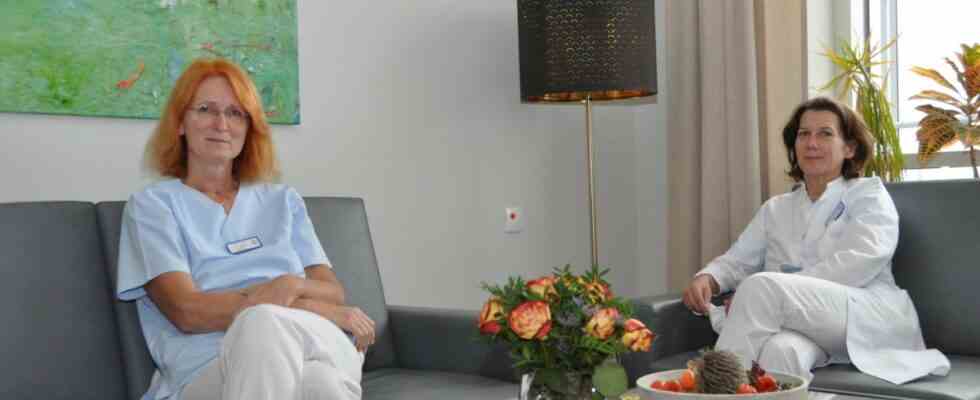According to a press release by the German Society for Palliative Medicine, the number of palliative care units has been falling nationwide since the beginning of the corona pandemic. The main reason is the staff shortage. The Kreisklinik Ebersberg can continue to offer a palliative care unit. Senior physicians Anna Bresele and Michelle Ulrich, both specialists in palliative medicine and anesthesia, explain why this is so important.
Ms. Bresele, since joining the palliative care team in 2008, the number of beds has increased from six to ten. Has the need increased?
Anna Bresele: Yes, clearly even. More and more patients are thinking about how they would like to be treated medically in the event of an incurable illness, for example, and are writing a living will. Most of the time, after long, often stressful therapies, all they want is an improvement in their quality of life. The symptoms on our ward have also changed in recent years. While it used to be almost exclusively patients with cancer who came to us, it is now also people with chronic internal diseases such as cardiac insufficiency or lung diseases or neurological diseases such as Parkinson’s disease and dementia.
How can you help these people?
Michelle Ulrich: I would like to emphasize that patients do not come to us exclusively to die. Many need support in the last phase of life, both physically and psychologically. Palliative medicine treats symptoms such as pain, shortness of breath or anxiety. On average, patients stay with us for ten to 14 days before they return home or go to a nursing home or hospice, depending on the situation.
Bresele: Our primary goal is to enable patients to continue living with the best possible quality of life – physically, mentally and spiritually. The conventional medical, drug therapy of symptoms forms the basis of our treatment. However, we also try to support patients and relatives with their fears and worries in discussions and to find solutions together with them. It is also important for those affected to recognize their own limits in order to be able to accept professional help.
What other help do patients get?
Bresele: For example physiotherapy. Our team also includes physiotherapists and occupational therapists who have palliative training and deal intensively with the patients. Physiotherapy not only plays a major role for the body, but also for the psyche. Any physical progress, such as being able to walk a few more meters down the aisle, is motivating and gives the patient the feeling of being in control of themselves and being able to do something for themselves. Another example is respiratory therapy. Here, patients with shortness of breath use special techniques to learn how to deal better with these symptoms and with existential fears.
Ms. Ulrich, you have been part of the team since January 2021 and are also a specialist in pain therapy. How does this benefit patients?
Ulrich: Well, since pain is a very common symptom in palliative care, my experience in pain management is helpful. There are different forms of pain and the causes can also be different. Some forms of pain, such as grief, cannot be alleviated by drug therapy alone. For example, we try to support the patients with approaches from complementary medicine, such as aromatherapy.
Does the palliative care unit also work with other departments or institutions?
Bresele: Yes, in the Ebersberg district clinic we cooperate with the breast, bowel and prostate center as well as radiotherapy. If necessary, patients from these departments are transferred to us. We also accept patients from established doctors and clinics, also in the wider area, and for the discharge of patients we maintain contacts with hospices, care facilities and teams of specialized outpatient palliative care (SAPV).
What do you wish for palliative care in the future?
Ulrich: I often experience that patients feel abandoned or rejected when they come to us. That’s because they don’t know what palliative care does. I would therefore like more information from the population so that palliative care stations lose their stigma as “death stations”.
Bresele: I’m glad that there is a palliative care unit in Ebersberg and I hope it stays that way. People who have to struggle with a serious illness at the end of their lives and their relatives need holistic, individual care in order to get through this difficult time within the framework of the family. As a society, we should give them that support.

